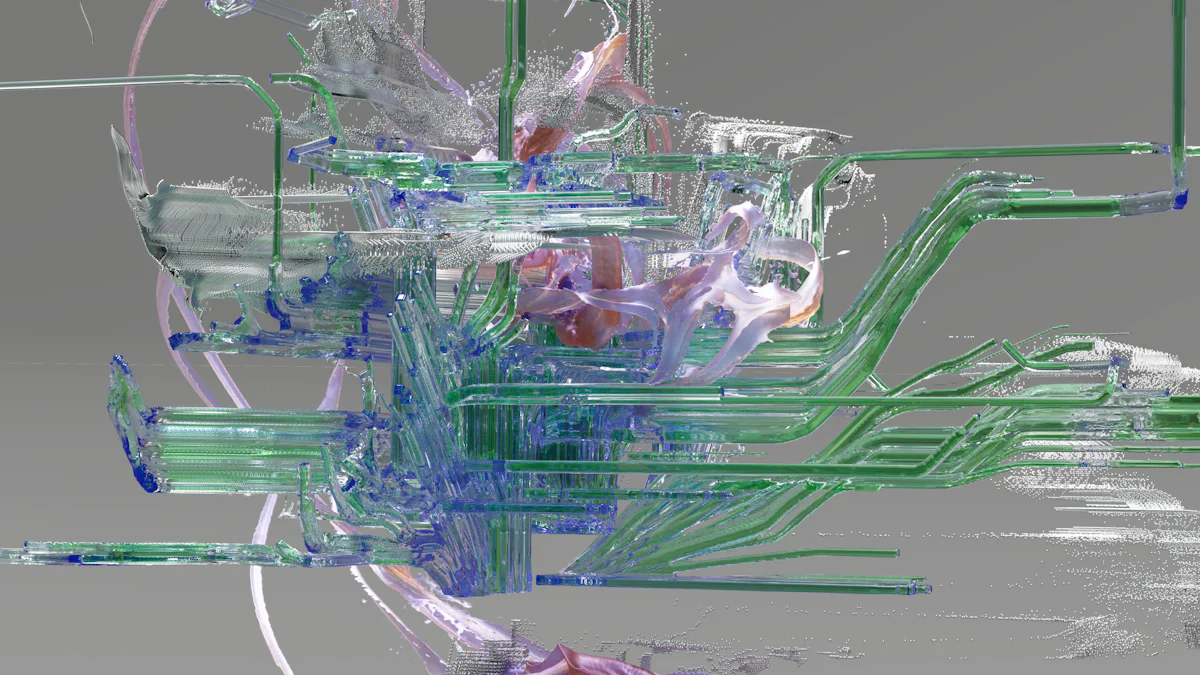2024: Top OpenAI Alternatives Revealed for the Future

The Future of AI Writing Platforms
In the year 2024, there is a noticeable surge in the demand for OpenAI alternatives as a result of the limitations presented by GPT-3. The quest for a substitute for OpenAI has gained momentum within the AI community, prompting researchers and developers to explore new avenues for enhancing AI-driven content creation. The need for a replacement for OpenAI has become increasingly evident, leading to the emergence of innovative platforms that offer advanced capabilities in the realm of AI language tools.
The evolving landscape of AI writing platforms is indicative of a shift towards diversification and specialization, with an emphasis on addressing the shortcomings of existing solutions. As content creators seek more robust and versatile options, the exploration of alternative platforms to OpenAI is shaping the future trajectory of AI-driven content creation.
AI Language Tools Growth
In the realm of AI language tools, rapid advancements are significantly shaping the future landscape of content creation. The evolution of artificial intelligence language tools, coupled with machine learning capabilities, is revolutionizing the way content is generated and presented to audiences.
Evolution of AI Language Tools
The evolution of AI language tools has been marked by remarkable progress in natural language processing and understanding. These tools have transcended traditional limitations, enabling more sophisticated interactions between humans and machines. As a result, content creation processes have become more efficient and effective, allowing for the generation of high-quality material at an unprecedented pace.
Impact on Content Creation
The impact of AI language tools on content creation cannot be overstated. These innovative technologies have revolutionized the way content is conceptualized, developed, and delivered to diverse audiences. The seamless integration of AI language tools into various platforms has streamlined the process of generating engaging and informative content, ultimately enhancing the overall quality and relevance of materials produced.
Exploring Claude
Features of Claude
Claude, as an AI writing platform, distinguishes itself through a myriad of advanced features tailored for AI-based content generation. Its robust capabilities encompass natural language processing, enabling users to effortlessly create compelling and contextually relevant content. The platform's intuitive interface facilitates seamless interaction, allowing content creators to harness the power of AI with ease.
One notable feature of Claude is its adaptive learning algorithms, which continuously refine the quality of generated content based on user interactions. This dynamic approach ensures that the platform evolves in tandem with user preferences and industry trends, thereby enhancing its effectiveness in meeting diverse content creation needs.
Another key aspect of Claude's feature set is its comprehensive language model, which empowers users to generate content across various domains and styles. From technical documentation to creative storytelling, Claude offers a versatile toolkit that caters to a wide spectrum of content requirements. Additionally, the platform's ability to comprehend nuanced linguistic nuances contributes to the production of authentic and engaging material.
User Experience
Users are actively immersing themselves in the exploration of Claude's capabilities for diverse content creation needs. The seamless integration of advanced AI features within an intuitive user interface has garnered positive feedback from creators across different industries. Content developers appreciate the platform's adaptability and responsiveness, as it enables them to streamline their workflows while maintaining high standards of quality.
Moreover, Claude's user-centric design fosters a collaborative environment where individuals can leverage AI-driven assistance without compromising their unique creative perspectives. This inclusive approach enhances the overall user experience, positioning Claude as a formidable contender in the realm of AI-driven content creation.
Google Gemini Unveiled
Google Gemini, a new entrant in the realm of AI writing platforms, has been generating significant attention as a potential alternative to OpenAI. This innovative platform is poised to offer a fresh perspective on AI-driven content creation, introducing unique features and capabilities that cater to the evolving needs of content developers and creators.
Introduction to Google Gemini
Google Gemini represents a paradigm shift in the landscape of AI language tools, offering a holistic approach to content generation. With its intuitive interface and robust underlying technology, Google Gemini aims to empower users with advanced AI capabilities for seamless content creation across diverse domains and styles. The platform's emergence has sparked curiosity within the industry, positioning it as a promising contender in the quest for viable alternatives to established AI writing solutions.
Functionality and Capabilities
Powerful Content Generation: Google Gemini harnesses powerful features tailored for AI-driven content creation, enabling users to generate high-quality material with ease.
Versatile Language Model: The platform boasts a versatile language model that facilitates the production of engaging and contextually relevant content across various genres and subject matters.
Adaptive Learning Algorithms: Google Gemini incorporates adaptive learning algorithms designed to refine the quality of generated content based on user interactions, ensuring continuous improvement and relevance.
Seamless Integration: With its emphasis on user experience, Google Gemini offers seamless integration of advanced AI features within an intuitive interface, fostering an environment conducive to efficient and collaborative content creation.
The unveiling of Google Gemini signifies a pivotal moment in the evolution of AI language tools, heralding new possibilities for streamlined and innovative content creation processes.
Unveiling Llama2
Llama2, a new entrant in the realm of AI content creation, has garnered attention as a potential game-changer in the landscape of AI writing platforms. With its innovative approach and advanced capabilities, Llama2 is poised to make significant strides in revolutionizing the content generation process.
Llama2: A New Contender
Llama2 distinguishes itself as a versatile and powerful AI writing platform tailored to meet the diverse needs of content creators. Its comprehensive suite of features encompasses advanced natural language processing and adaptive learning algorithms, enabling users to craft engaging and contextually relevant content across various domains and styles. The platform's emergence has sparked curiosity within the industry, positioning it as a formidable contender in the quest for cutting-edge AI-driven content creation tools.
Comparative Analysis
As Llama2 enters the competitive landscape of AI writing platforms, it is being meticulously evaluated through comparative analysis with existing solutions. Industry experts and content creators are exploring Llama2's unique features, seeking to understand how it stands out from established platforms. The platform's potential to address specific pain points and offer innovative functionalities is drawing attention, leading to insightful comparisons that highlight its strengths and capabilities.
Industry Expert: "Llama2's adaptive learning algorithms and versatile language model set it apart from traditional AI writing platforms, presenting an exciting prospect for content creators looking for enhanced capabilities."
Ethical AI Content Creation
Addressing Ethical Considerations
The rapid advancement of AI technology in content creation has brought to the forefront a growing awareness of the ethical implications associated with its use. As AI language tools continue to evolve, there is an increasing focus on addressing the ethical considerations that arise from the integration of artificial intelligence into content generation processes.
Content creators and developers are recognizing the need to navigate the moral implications of AI writing, ensuring that ethical standards are upheld throughout the content creation journey. This involves a conscientious approach to leveraging AI capabilities while upholding principles of fairness, transparency, and accountability in content development.
Biases and Challenges
The evolving landscape of AI content creation presents notable challenges related to biases and ethical considerations. One of the primary concerns revolves around the potential biases embedded within AI algorithms, which can inadvertently perpetuate societal or cultural prejudices in generated content. Content developers are tasked with mitigating these biases by implementing measures that promote inclusivity and diversity in AI-driven content creation.
Moreover, as AI language tools continue to shape the future of content creation, there is a pressing need to address the ethical challenges associated with automated content generation. This includes ensuring that AI-generated material aligns with ethical standards and does not compromise the integrity or authenticity of information presented to audiences.
The industry's collective attention toward ethical AI content creation underscores the importance of fostering an environment where technological innovation aligns harmoniously with ethical considerations, ultimately shaping a responsible and sustainable future for AI-driven content creation.
Shaping the Future of Content Creation
AI's Role in Future Content Creation
The role of AI writing platforms in shaping the future landscape of content creation is pivotal. As we look ahead to the evolution of content creation, it becomes increasingly evident that AI-driven technologies will play a central role in driving innovation and efficiency across diverse industries.
AI writing platforms are poised to revolutionize the way content is conceptualized, developed, and distributed. By leveraging advanced natural language processing and machine learning capabilities, these platforms have the potential to streamline content creation processes, enabling creators to produce high-quality material at an unprecedented pace.
Furthermore, the integration of AI into content creation workflows empowers creators with tools that enhance creativity and productivity. From automating repetitive tasks to providing valuable insights for strategic content development, AI writing platforms are set to become indispensable assets for individuals and organizations seeking to stay ahead in the rapidly evolving landscape of digital content.
Innovation and Possibilities
The potential of AI in content creation opens up new avenues for innovation and possibilities. With continuous advancements in AI language tools, we can anticipate a wave of innovative features and functionalities that cater to evolving content creation trends. These innovations may encompass enhanced collaboration capabilities, personalized content generation based on user preferences, and adaptive learning algorithms that refine the quality and relevance of generated material.
Moreover, as AI continues to evolve alongside human creativity, there is immense potential for synergistic partnerships between AI writing platforms and human creators. This collaborative approach fosters a dynamic ecosystem where AI augments human ingenuity, leading to the development of more impactful and resonant content experiences.
As we embrace the future of content creation powered by AI technologies, it is essential to remain attuned to emerging trends and opportunities that shape the way we engage with digital content. The convergence of human creativity with AI-driven innovation holds promise for unlocking new frontiers in storytelling, knowledge dissemination, and audience engagement.
Embracing OpenAI Alternatives
In response to the limitations of GPT-3, the quest for a substitute for OpenAI has gained significant momentum within the AI community. The emergence of innovative platforms such as Claude, Google Gemini, and Llama2 reflects a growing demand for advanced alternatives that address the evolving needs of content creators. These platforms offer robust capabilities in AI-driven content creation, positioning themselves as viable replacements for OpenAI.
As content creators explore diverse options to enhance their content creation workflows, the availability of compelling alternatives to OpenAI presents an opportunity to embrace innovative solutions tailored to specific requirements. The landscape of AI-driven content creation is undergoing a transformative shift, with a focus on diversification and specialization that aligns with the quest for effective substitutes for OpenAI.
The evolution of AI language tools and the introduction of alternative platforms underscore the industry's readiness to embrace openAI alternatives that offer enhanced features and functionalities. This collective embrace of OpenAI alternatives signifies a pivotal moment in shaping the future trajectory of AI-driven content creation, fostering an environment conducive to innovation and progress.
Industry Expert: "The emergence of OpenAI alternatives marks a significant shift in the AI writing landscape, providing content creators with diverse options that cater to their unique needs."
By embracing OpenAI alternatives, content creators are poised to harness advanced capabilities that not only address the limitations presented by existing solutions but also pave the way for groundbreaking advancements in AI-driven content creation.
See Also
Exploring the Best Scheduling Software Options for 2024
Analyzing Automation Tools for URL Bots in AI Sales Chatbots
Revolutionizing Lead Management with AI Chatbots in B2B Outreach
Is ChatGPT the Future of Customer Service in Managed Live Chat?

